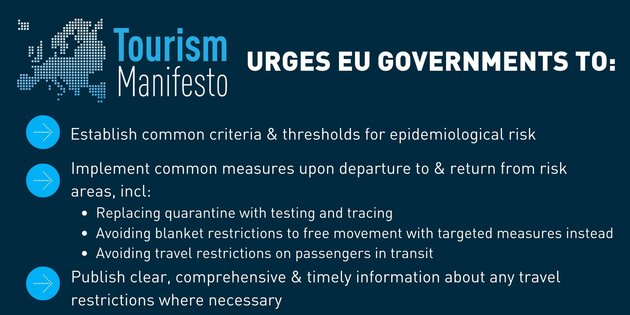
The European Tourism Manifesto Alliance, the voice of the European travel and tourism sector, calls on Member States to urgently agree on harmonised travel restrictions and ensure swift implementation to help the sector survive this unprecedented crisis.
The European Tourism Manifesto alliance applauds renewed efforts of the European Commission as well as the initiative from the German Presidency of the Council of the European Union from last week to improve coordination on cross-border travel and restore the integrity of the Schengen area. The need for continued COVID-19 control is foreseeable and, under Art.24 of the Schengen Borders Code, any related border restrictions must be coordinated. In the wake of an expected dramatic economic downturn, it is crucial that travel within the EU and the wider European area (including EEA, UK and Switzerland) be carefully and quickly restored. In addition, international coordination to re-establish transatlantic travel would provide a vital boost to the travel and tourism sector.
European travel and tourism is the ecosystem most affected by the coronavirus crisis due to insufficiently coordinated travel restrictions, declining traveller confidence and reduced consumer demand. The 2020 summer season was strongly impacted by this crisis, with traveller confidence reaching a record low. Hotel occupancy rates in Europe were at 26.5% in July 2020, which accounts for a fall of 66.4% compared to the same month last year. Moreover, top 5 European destinations, such as France, Germany, the UK, and the Netherlands only saw just 40% of 2019’s volumes for intra-European travel, with Spain lagging at 22% of last year’s volumes.
While many Europeans were keen to travel again during the summer, the inconsistent and ever-changing border restrictions along with confusion about quarantine and test requirements, caused frustration for both businesses and travellers, deterring booking and damaging materialisation for both leisure and business travel.
We call on national governments to urgently approve the European Commission’s proposal and to:
1. Establish common criteria and thresholds for determining epidemiological risk, including a common colour-coding system to identify risk areas. These criteria should be evaluated on a detailed regional level, considering relevant geographical factors (particularly islands).
2. Implement common measures to put in place upon departure to and return from risk areas. These measures should be determined with sufficient detail and based on scientific evidence (as there is no reason to restrict travel to entire countries if only certain regions are affected), and comprise:
3. Follow a common structured and transparent process to publish clear, comprehensive and timely information about any travel restrictions where these are needed. Information should also be made available on the ‘Re-open EU’ web platform.
The sector has been calling for better coordination between Member States and a harmonised European approach to travel restrictions and safety measures since the start of the COVID-19 pandemic. Such an approach will help rebuild traveller confidence and help the sector in its slow recovery, protecting millions of livelihoods, jobs, and enterprises. Pending the return of significant visitor flows, continued financial support for the sector is necessary so that the European tourism ecosystem returns employment to the economy as soon as possible.
Proving the importance of tourism recovery as a catalyst for European economic revival, the latest WTTC research shows that every 2.7% increase in travel flows would generate or bring back one million jobs in the sector. Harmonising the inconsistent patchwork of COVID-19 rules and travel advice in Europe could lead to an increase in travellers by as much as 27%, recreating 10 million jobs in travel and tourism across Europe.
Media contact
Shane Bradley
Hume Brophy Communications
Ph: +32 (0)2 234 6860
Note to editors
The European Tourism Manifesto alliance gathers more than 60 European public and private organisations, covering the whole tourism value chain and beyond. The alliance calls on the European Union for action on key policy priorities for the tourism sector. For more information, please visit tourismmanifesto.eu.
Manifesto statement on harmonization of travel restrictions